
Back شعار النرويج Arabic شعار النرويج ARZ Norveç gerbi Azerbaijani Герб Нарвегіі Byelorussian Герб Нарвэгіі BE-X-OLD Герб на Норвегия Bulgarian নরৱের চিনত্হান BPY Grb Norveške BS Escut de Noruega Catalan Státní znak Norska Czech
| Coat of arms of Norway | |
|---|---|
 Design by Sverre Morken, 1992 | |
| Versions | |
 (Royal) design by Eilif Peterssen, 1905 | |
 (Royal) achievement | |
 The banner of arms, which serves as royal standard | |
| Armiger | Harald V, King of Norway (royal version) Government of Norway (state version) |
| Adopted | 1280 or earlier |
| Shield | Gules, a lion rampant Or, crowned and bearing an axe Or with blade Argent |
| Order(s) | Order of St. Olav |
| Other elements | Mantle |
The coat of arms of Norway is the arms of dominion of King Harald V of Norway, and as such represents both the monarch and the kingdom (nation and the state). It depicts a standing golden lion on a red background, bearing a golden crown and axe with silver blade (blazoned Gules, a lion rampant Or, crowned Or, holding an axe Or with a blade argent).
The coat of arms is used by the King (including the King's Council), the Parliament, and the Supreme Court, which are the three powers according to the Constitution. It is also used by several national, regional, and local authorities that are subordinate to the aforementioned, for example the County Governors and both the district courts and the courts of appeal. Since 1905, two parallel versions exist: the more elaborate version used by the King and the simpler one used by the State. The arms in banner form serve as basis for the monarch's flag, known as the Royal Standard.
In addition, there are former and existing lands (e.g. the Earldom of Iceland and the Orkney Islands), cities (e.g. Kristiansand), organisations (e.g. the Museum of Cultural History), companies (e.g. Adresseavisen), and families (e.g. the Counts of Gyldenløve and Gudbrand Gregersen) who have been granted the right to bear the coat of arms or derivations of this. Unless officially granted, it is illegal to use the coat of arms.
The arms has its origin in the 13th century, at first just as a golden lion on a red shield, with the silver axe added late in the century, symbolising Olav II as the Eternal King of Norway. In origin the arms of the Sverre dynasty, the coat of arms became quartered with that of the Bjälbo dynasty when the Sverre lineage was extinct in 1319, and the Sverre coat of arms figured as part of the further divisions of the coats of arms of Norwegian kings during the early modern period.
The Sverre coat of arms was regarded as representing the Norwegian monarchy in the late 15th century, and it came to be used to represent Norway on coins and in seals during the union with Denmark (1523−1814) and the 19th-century personal union with Sweden, its 13th-century origins placing it among the oldest state coats of arms which remain in contemporary use. The axe tended to be depicted as a curved pollaxe or halberd from 1500 until 1844. The 1844 design approved by king Oscar I reverted to the depiction of a battle-axe as shown in medieval designs.
After the dissolution of the union with Sweden in 1905 a medieval-type escutcheon and charge was designed by Eilif Peterssen. Peterssen's design would be used until 1937 when it was re-designed by state archivist Hallvard Trætteberg, resulting in a markedly different, more simplified design style. Peterssen's design has, however, been retained in the Royal Standard and coat of arms.[1]
- ^ "The style of the lion in the Royal standard has, however, not been changed. The 1905 version is still in use. The style and design of the lion on the Norwegian coat of arms were changed from the 1905 version in 1937, and the result is two very diverging drawings. The whole drawing is strictly flat or 'stylized'. This redrawing was the work of state archivist Hallvard Trætteberg - his point of view on heraldry strongly influenced public heraldry since the early 1930s (see for instance the county flags). There have been minor changes to the lion in the coat of arms - most recently in 1994. The Royal Ministry of Foreign Affairs produced some very attractive brochures on the flag and arms last year - also mainly in Norwegian but with nice pictures" (Jan Oskar Engene, 24 November 1995) crwflags.com